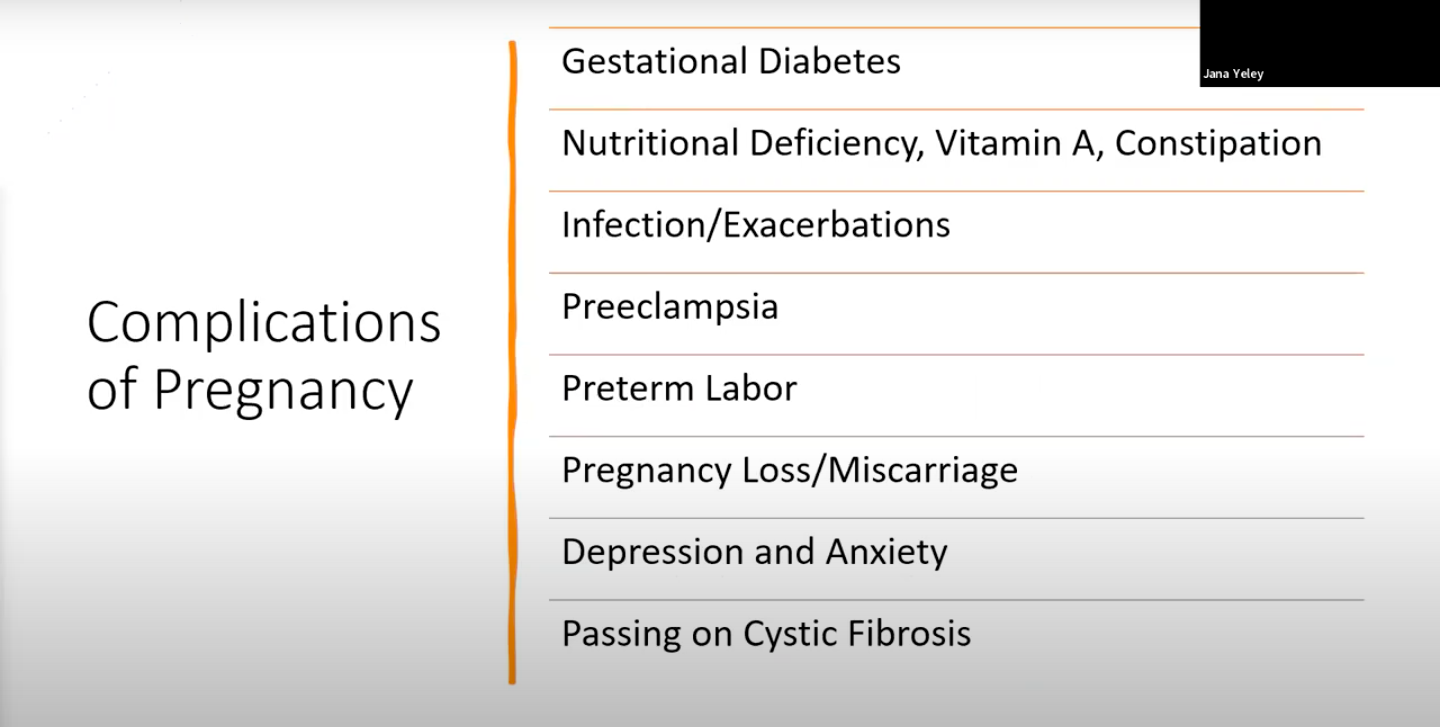On April 12, 2022, Pulmonary Critical Care nurse practitioner Jana Yeley from Indiana University, discussed possible pregnancy outcomes when you have CF. Yeley started off her presentation by showing the drastic increase in pregnancies reported by people with CF from 2019 (309 pregnancies) to 2020 (619 pregnancies), saying that it’s clear that modulators have made people with CF more fertile. She highlighted some common complications of pregnancy with CF, shown in this slide:

Aside from the last issue, passing on CF, she pointed out that these are also common complications in pregnancy in general, for people without CF as well.
Yeley went into detail about these common complications in the rest of her presentation. She said that while most obstetricians will suggest screening for gestational diabetes in the second trimester, her team at the CF clinic will have their CF patients screen in the first trimester to be more proactive, since CFRD and pre-diabetes are common. It’s important to treat gestational diabetes because it can affect the baby; it can lead to large for weight babies, hypoglycemia, jaundice, respiratory distress syndrome, low calcium or magnesium levels – which can cause cramping or twitching – and infections.
In regard to nutritional deficiencies and low vitamin A levels, Yeley explained that working closely with their clinic dietician helps pregnant people with CF avoid complications related to that. Constipation is a possible symptom of this issue. Again, this is important to address, because it can affect the baby; nutritional deficiencies can lead to poor fetal growth and premature delivery.
Passing on infection to the baby is a common complication in pregnancy, especially with sexually transmitted infections. Screening for these is suggested, because they may not always be symptomatic. In CF specifically, lung exacerbations can become an issue because certain antibiotics are not safe during pregnancy. She gave an example of how Colistin is usually substituted for Tobi or Cayston. Often, hospitalization is suggested over home care, so that multiple things can be monitored and cared for all at once.
Yeley explained that preeclampsia plays out the exact same way for people with CF as it does in the non-CF population. The same goes for preterm labor, with the exception that CF comes with its own set of risk factors: lower lung function, diabetes, B. Cepacia infection, and other infections. Interestingly, pregnancy loss, miscarriage, depression, and anxiety also plays out the same way for people with CF as people without CF. It is important to note that one in eight people experience postpartum depression.
Yeley went on to briefly discuss the potential complications of becoming pregnant after a lung or other organ transplant such as premature birth, low birth weight, preeclampsia, diabetes, and infection. Also, there are risks of rejection or medication-caused birth defects. She shared that there is some newer evidence indicating that these risks may decrease, the longer a person has been transplanted.
To conclude her presentation, Yeley mentioned decision making tools that are available for prenatal screening and she recommended that people with CF see a genetic counselor before pregnancy.
